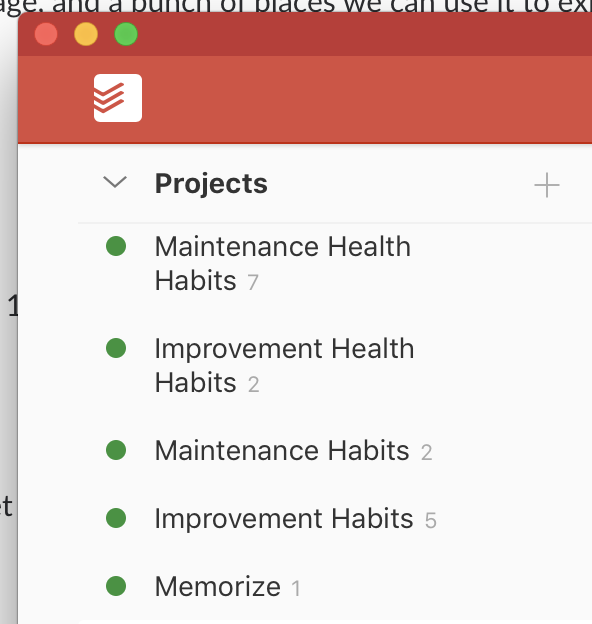I'm often asked about my personal productivity strategies, and the number one tip that I like to give out is the benefit of making habits of the things that you find valuable. It is said that it takes 21 days for form a habit, and that one must be committed to establishing it. I could argue that if you can remember to do something for 21 days, you've already made it a habit. If the habit I want to create is eating delicious cake every day, I suspect I could do without help. When it's remembering to floss, on the other hand, I might forget if I'm in a hurry, or even blow it off. In this case, I find that checklists help.
 Applications like Todoist work for me, as they let me make a checklist of tasks and set them to repeat daily (or in some cases, on weekdays, weekends, or whatever schedule works for me). Initially, I had a single checklist, but I found this difficult to work with. Sometimes there are tasks that are expected on a given day but just aren't going to get done, often for very good reason. For example, one task I have is to make a daily journal entry about a particular topic. The problem is that the topic doesn't generate activity every day, so checking off this task when there is nothing to journal about is perfectly okay - but I get "credit" in the app for actually doing it. There is no way to mark it, as we'd say in the betting world, "no action."
Applications like Todoist work for me, as they let me make a checklist of tasks and set them to repeat daily (or in some cases, on weekdays, weekends, or whatever schedule works for me). Initially, I had a single checklist, but I found this difficult to work with. Sometimes there are tasks that are expected on a given day but just aren't going to get done, often for very good reason. For example, one task I have is to make a daily journal entry about a particular topic. The problem is that the topic doesn't generate activity every day, so checking off this task when there is nothing to journal about is perfectly okay - but I get "credit" in the app for actually doing it. There is no way to mark it, as we'd say in the betting world, "no action."
My solution was to split out my list into two categories and then split those into two more. The two categories are health habits and all other habits. I treat health differently because many of the items are non-negotiable. Take my blood pressure medication, for example. That goes into the second split of "maintenance," which means that it's a "no excuse" task.
Tasks that aren't maintenance are improvement, and those are the ones that, more often than not, wouldn't get done if I didn't hold myself accountable. Improvement health tasks like working out or meditating (though that's becoming more attractive the more I do it). Improvement habits like committing to writing at least one sentence a day (hat tip to Stephen Barnes for this one).
In all cases, checking them off provides the dopamine reaction I'm after. I want to see, every day, 100% on maintenance tasks, and as close as I can get on the improvement tasks. If something can't be done regularly, I re-evaluate it to see if it must be dropped from the list or if I need to make adjustments to make it possible.
Bonus List: I have one for "Memorize." This is, obviously, anything I need to commit to memory. I put the text in a task and read it once per day and then check it off. After a time, the every-day repetition gets the job done and I can remove the task. Ask me to do some Shakespeare for you some time - this is how I memorized Dogberry's part in Much Ado About Nothing ;)
Do you think this would work for you? I'd love to hear thoughts and refinements! What would you add/change to this?